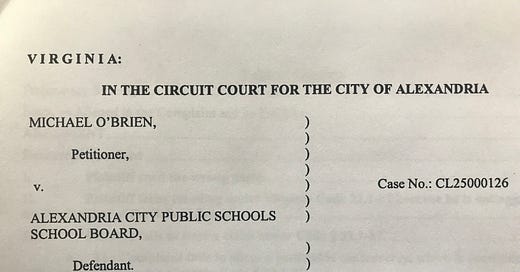Judge Dismisses JH Parent Lawsuit
Judge James Clark Rules for ACPS School Board. From The Alexandria Times, June 12, 2025.
Retired Alexandria Circuit Court Judge James C. Clark dismissed the case brought against the Alexandria School Board by a parent objecting to the Board’s controversial December 2024 decision to convert Jefferson-Houston PreK-8 IB School to a middle school.
Clark held a hearing on the Board’s demurrer, or motion to dismiss, on April 23.
Plaintiff Michael O’Brien sued the Board under Virginia Code §22.1-87 to seek judicial review of the decision.
“Any parent, custodian or legal guardian … who is aggrieved by an action of the School Board may, within 30 days after such action, petition the circuit court having jurisdiction in the school division to review the action of the School Board,” the code states. “... The action of the School Board shall be sustained unless the School Board exceeded its authority, acted arbitrarily or capriciously or abused its discretion.”
O’Brien is a parent of two children at Jefferson-Houston, which the Board voted to convert to a middle school in the 2030s to create more middle school capacity.
This decision was controversial, as many parents did not think the Board was voting on a final plan for the K-8 schools at the final meeting of 2024 and the Board’s term. Four members left the Board and two of them, Abdel Elnoubi and Jacinta Greene, voted against the measure in a 7-2 vote. Elnoubi and Greene and now sit on City Council.
The Hearing
At the hearing, O’Brien argued that he was aggrieved, even though his children will likely not be at Jefferson-Houston when it becomes a middle school. He argued that the conversion of the building to a middle school could occur earlier and may harm his children.
“[The School Board can not] impute a level of competence to my kids that eliminates my standing. There’s a distinct possibility my kindergartner doesn’t pass grades on time. He could fail a grade, especially if there is no principal or there are no good teachers at the school,” O’Brien argued.
The Board’s counsel argued that the code authorizes judicial review of a Board decision only if a plaintiff alleges and proves “a substantial grievance and a denial of some personal or property right, legal or equitable, an imposition of burden, different from the public generally,” which was not alleged in this case.
The Board’s counsel also argued that because the plaintiff’s children “… will attend the school for the entirety of their K-12 education, essentially, as they would have prior to the decision,” neither they nor the plaintiff were “aggrieved” as required by the statute.
Clark ruled that the Board acted in conformity with the code.
“I also don’t find that the School Board acted in a fashion that was arbitrary or capricious or that deprived the public of an opportunity to be heard,” Clark said in the hearing.
Among other alleged flaws by the Board, the plaintiff objected to how the 7-2 vote occurred.
“The Board waited until all opportunities for the community to voice concern about the Board’s improperly noticed proposal to ‘make a plan’ to eliminate elementary education from Jefferson-Houston before amending that plan into the directive subject,” O’Brien’s complaint reads, meaning that instead of passing a motion to make a plan, the Board made a final decision about what would have been the object of the plan.
O’Brien also argued that the Board did not provide public notice of the decision as required by Virginia Code §22.1-79.
“Each School Board shall … obtain public comment through a public hearing not less than seven days after reasonable notice to the public in a newspaper of general circulation in the school division prior to providing (i) for the consolidation of schools; … or (iii) in school divisions having 15,000 pupils or more in average daily membership, for redistricting of school boundaries or adopting any pupil assignment plan affecting the assignment of 15 percent or more of the pupils in average daily membership in the affected school,” the code states.
The Board’s counsel argued the conversion of Jefferson-Houston to a middle school was neither a consolidation or transfer of services, nor did O’Brien allege this plan affects 15% or more of Jefferson-Houston’s students, nor did O’Brien meet the statutory standard. The Board’s counsel wrote:
“[O’Brien] fails to allege the School Board exceeded its authority, acted arbitrary and capriciously or abused its discretion because the plaintiff’s arguments about inadequate notice were directly contradicted by [O’Brien’s] own references,” Board counsel said. “The School Board outlined a schedule for community outreach, recommendation, report and decision beginning in April of 2024. This decision was made in December.”
At the conclusion of the hearing on the Board’s motion to dismiss, Clark, ruling from the bench, stated the Board “jumped through the necessary hoops” in terms of public notice.
Clark focused on what “aggrieved” means in context of code §22.1-87.
“I think that you [O’Brien] filed your petition in absolute good faith in an effort to do what’s best for your kids. But, unfortunately, I think the School Board wins this one,” Clark said in the hearing. “It’s speculative to suggest that you – or more particularly your kids – are aggrieved parties by the notion that your kindergartner could perhaps be required to repeat a grade.”
Clark said this Board decision and motion to dismiss represents democracy in action.
“Just like many things in a democracy, particularly these days, an elected body did something that some of us disagree with. And unfortunately, Mr. O’Brien, I think it’s just that simple,” Clark said. “And I think we’re stuck oftentimes with the decisions that the folks that the majority elected come up with. I think this is one of them.”
-aboutalexandria@gmail.com
Thanks for reading About Alexandria!
Subscribe for free to receive new posts.





